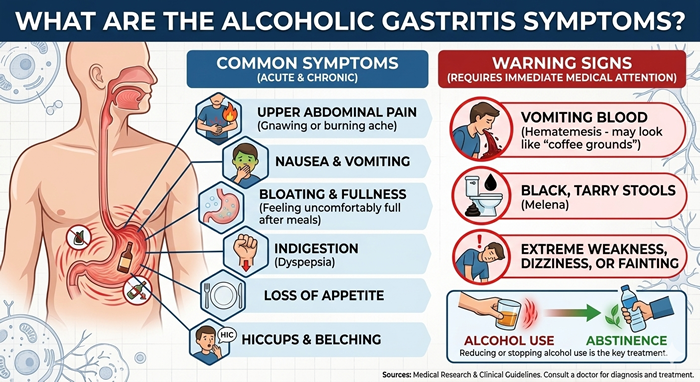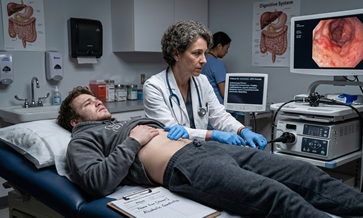After a big night out that involved lots of alcohol, a common hangover symptom can be stomach pain, alcoholism stomach pain. An irritating abdominal pain, alcohol related stomach pain can be a real inconvenience the day after a night out, disrupting how you eat and making your day an all around uncomfortable experience.
However, what’s even worse is that this stomach pain could be a sign of a much more severe health issue caused by excessive alcohol consumption, known as alcohol gastritis. Alcohol gastritis symptoms include acute abdominal pain, acute gastritis and indigestion, all of which essentially mean that alcohol has irritated the lining of you stomach. While this mightn’t sound too severe, it’s important to understand exactly how and why this illness can occur as alcoholic gastritis can lead to stomach ulcers, stomach cancer and other serious conditions that are definitely not worth a night of binge drinking.
How Alcohol Irritates The Stomach Lining
 As we all know, the way the stomach works is relatively simple. Part of the stomach gastrointestinal tract system that digests food, the stomach takes the nutrition your body needs from food and gets rid of the waste. The stomach does this by adding acid and enzymes to food and drink you consume, breaking them down before they carry on their journey through your gut.
As we all know, the way the stomach works is relatively simple. Part of the stomach gastrointestinal tract system that digests food, the stomach takes the nutrition your body needs from food and gets rid of the waste. The stomach does this by adding acid and enzymes to food and drink you consume, breaking them down before they carry on their journey through your gut.
This process is the same for alcohol. When you consume large amounts of alcohol, your body reacts by introducing large amounts of acid to your stomach, which throws off the balance of the stomach’s contents and can gradually wear away your stomach lining and make it inflamed and painful. Therefore, drinking alcohol is sometimes associated with stomach acid rising up into your throat, or causing heartburn, as these are all symptoms of overly large presence of acid in this stomach.
Over weeks or months, the presence of this acid, brought on by consumption of alcoholic drinks means a person has the chance to develop painful ulcers in your stomach lining, which can cause severe issues and wreak havoc on the stomach and digestive system.
What Is Alcoholic Gastritis?
The medical term for this increase of acid within a person’s stomach is acute gastritis, with alcohol related gastritis therefore known as alcoholic gastritis. This alcoholism stomach pain, known as alcoholic gastritis, is one of many physical conditions that can develop as a result of abusing alcohol. While this problem can often seem to be nothing more than a recurrent stomach-ache after drinking or heartburn, it can also signal the development of additional health complications such as ulcers that might be avoided altogether by not drinking.
 When stomach pain is felt consistently after drinking alcohol for an extended period of time, the diagnosis for this alcoholic gastritis can go from acute to chronic gastritis. Chronic gastritis is a long-term condition where the stomach lining remains inflamed and is worn down over time.
When stomach pain is felt consistently after drinking alcohol for an extended period of time, the diagnosis for this alcoholic gastritis can go from acute to chronic gastritis. Chronic gastritis is a long-term condition where the stomach lining remains inflamed and is worn down over time.
Those who consume alcohol regularly may only experience minor symptoms for an extended period, because of decreased sensitivity from continued alcohol use.
This makes the condition even more dangerous as it means that as the condition develops, it simultaneously becomes harder and harder to diagnose.
What Are The Alcoholic Gastritis Symptoms?
As discussed previously, alcoholic gastritis can develop after repeated alcohol consumption begins to irritate or even erode parts of the stomach lining, hence why it is known alcoholism stomach pain. This, in turn, can leave the stomach lining more vulnerable to the acidic digestive juices normally produced by the body to digest food. In some cases, this issue can snowball even further, making the stomach itself more sensitive to acids or other potentially inflammatory ingredients in foods themselves, causing a self-perpetuating cycle of stomach irritation.
 The issue of alcoholic gastritis is made worse in people who have been consuming alcohol for extended periods of time or consume large amounts of alcohol regularly.
The issue of alcoholic gastritis is made worse in people who have been consuming alcohol for extended periods of time or consume large amounts of alcohol regularly.
Research supports this association between alcohol use and damage to the stomach lining, finding that gastric mucosal inflammation was present in 100% of test participants with a history of chronic drinking, making it very clearly an alcoholism stomach pain.
In those who were categorized as having an alcohol addiction and who had been drinking for more than 10 years, 13 out of 14 had a type of gastritis that was causing the stomach lining to atrophy, a case of severe permanent damage that could lead to life-threatening complications.
However, the issue with diagnosing alcoholic gastritis is that stomach lining irritation can be hard to pin down to a single culprit, with most alcoholic gastritis symptoms sharing similarities to symptoms of consuming irritating foods or having other stomach related issues. That is why it is best to go to a medical professional for an accurate alcoholic gastritis diagnosis. If you come to a doctor with an alcoholism stomach pain and a history or drinking alcohol, they will begin a series of tests to ascertain what the specifics of the issue are, before diagnosing you.
The first test is a simple breath test that is done to check for bacteria in your gut that cause gastritis. The test is a very straight forward process, where you simply drink a special clear liquid and then blow into a bag which is then quickly sealed and tested. This test will then reveal if the bacteria broke down the liquid in your stomach, highlighting their presence and increasing the likelihood that you have alcoholic gastritis of some kind.
 If this test comes back positive, the next step would be to undergo an X-ray of the upper gastrointestinal system. This includes the esophagus (the tube leading from your throat to the stomach), stomach, and duodenum (the upper part of your small intestine).
If this test comes back positive, the next step would be to undergo an X-ray of the upper gastrointestinal system. This includes the esophagus (the tube leading from your throat to the stomach), stomach, and duodenum (the upper part of your small intestine).
The doctor will ask you to first drink a liquid called barium, which helps show details on the X-ray, and then wait while they assess the results and see if anything becomes discoverable thanks to the X-ray.
If a doctor wants better confirmation before making their diagnosis, the next step would be to undergo an upper endoscopy. In this test, the doctor will use an endoscope, which is a thin, lighted tube with a camera at one end, to visually confirm their gastritis suspicions.
The doctor guides the endoscope down your throat to check your esophagus, stomach, and duodenum. They can also use the endoscope to remove some tissue for lab tests, which will again further confirm any hesitant diagnoses.
From here your history and test results help your doctor determine if you have gastritis and whether alcohol is a factor, from where the doctor can ten recommend a treatment plan for gastritis or any other conditions that they have diagnosed throughout the testing process. While treatment will differ, depending on how bad your gastritis is as well as your symptoms, age, and general health, most of the time, medication and other treatments ease gastritis symptoms quickly. However, if your gastritis is related to drinking, quitting or cutting back on alcohol needs to be part of your plan, too.
Contact one of our treatment specialists today on 877 322 2694.
